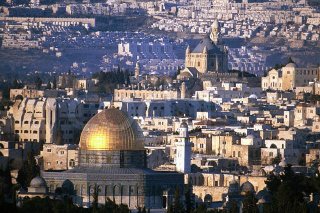 |
| Teddy Stadium, Jerusalem [Image Source] |
But in the current circumstances with a virus-borne plague turning life upside down everywhere, we've been distracted with the exigencies of life: staying indoors at home, worrying about family, taking care of food and supplies, protective items and hygiene aids. And engaging in numerous on-line meetings and webinars.
We're planning to do some catching up, starting now.
Word emerged in the past hour of terrorist arrests made by Israeli security in March. As reported by Times of Israel ["Shin Bet says it arrested Palestinians planning bombing of Jerusalem stadium"] today, the suspects are accused of
An updated report from Times of Israel adds these details:
And earlier in the day [Wednesday] in Jerusalem again, a Palestinian Arab driving a van through a security crossing (commonly known as the Kiosk Checkpoint) east of Jerusalem near the city of Maale Adumim at about 8:00 am carried out a combined vehicle-ramming and stabbing attack.
planning to carry out terror attacks in Jerusalem and the West Bank, including a bombing in the capital’s Teddy Stadium, the Shin Bet security service says.... The three members of the terror cell — Ahmad Sajdaya, Muhammad Hammad, and Umar Eid — initially planned to construct a bomb and set it off in Teddy Stadium, performing reconnaissance operations and other preparations, before realizing that this would be too difficult to carry out due to the venue’s tight security. Instead, the trio planned to carry out bombing attacks on IDF troops in the West Bank and attempted a number of attacks last month... [They] also assisted in a number of attempted bombings against Israeli troops in recent years.The Teddy Stadium, inaugurated in 1990 and named for long-time Jerusalem mayor Teddy Kolek, is owned by the Jerusalem municipality and has room for some 32,000 patrons. the largest sports stadium in the Middle East.
An updated report from Times of Israel adds these details:
- All three suspects were members of Kutla Islamiya, a university campus organization affiliated with the Islamist terrorists of Hamas.
- They got to know each when all three attended Birzeit University, located in Birzeit, near Ramallah, north of Jordan in an area controlled by the Palestinian Authority. Birzeit started life in 1924 as an elementary school for girls and acquired university status, while under Israeli control, in 1975.
- Sajdaya who is from Qalandiya has a history of involvement with explosive devices and lost part of a hand in a bomb preparation "accident" a few years ago.
- Eid, from Deir Jarir, holds an Israeli identity (blue) card. This helped him attend a soccer match at the Teddy Stadium a year ago. His goal was to gather intelligence with a view to blowing it up.
- Hammad, from the East Jerusalem neighborhood of Kafr Aqab, does not have permanent Israeli residency.
It's a developing story.
And earlier in the day [Wednesday] in Jerusalem again, a Palestinian Arab driving a van through a security crossing (commonly known as the Kiosk Checkpoint) east of Jerusalem near the city of Maale Adumim at about 8:00 am carried out a combined vehicle-ramming and stabbing attack.
The attacker was eventually shot dead by armed Border Police forces after running down and hurting a twenty-year-old officer standing in the security checkpoint. The driver then leapt from his vehicle, brandishing a pair of scissors which he used to stab the already injured Israeli. This is captured in the security camera video above.
The as-yet unnamed Israeli is reported in moderate condition and recovering in hospital.
Times of Israel says a pipe-bomb was found in the attacker's possession, indicating advance planning (notwithstanding the use of scissors) and a desire to inflict more serious losses than running down an Israeli sceurity person would suggest.
In the Aljazeera version, the attacker is identified as Ibrahim Halsa, 25, from the village of Sawahra. If they're right, it's located on Jerusalem's south-eastern edge. Israel National News reports that a number of
UPDATE 8:30 pm: And now reports of fires raging inside two of the several buildings that make up the Jerusalem City Hall complex. The Jerusalem Post says:
The as-yet unnamed Israeli is reported in moderate condition and recovering in hospital.
Times of Israel says a pipe-bomb was found in the attacker's possession, indicating advance planning (notwithstanding the use of scissors) and a desire to inflict more serious losses than running down an Israeli sceurity person would suggest.
In the Aljazeera version, the attacker is identified as Ibrahim Halsa, 25, from the village of Sawahra. If they're right, it's located on Jerusalem's south-eastern edge. Israel National News reports that a number of
"Arabs were injured in clashes in a-Sawahra village in the Jerusalem area, home of the Islamic operative who carried out the attack. Residents burned tires and IDF forces fired rubber bullets at them."The late attacker's family, sad to relate, now become eligible under the Palestinian Authority's bizarre reward scheme ("Pay to Slay, it's commonly called) for the families of dead terrorists.
UPDATE 8:30 pm: And now reports of fires raging inside two of the several buildings that make up the Jerusalem City Hall complex. The Jerusalem Post says:
The fire began in the main building of the complex... Once the fire was detected emergency procedures were activated and police and firefighters were called to the scene. The cause of the fire is still unknown. Eight teams of firefighters are currently at work putting out the fire and searching for anyone who might be trapped in the building.More when we know it.
Police arrested a 40-year-old man for allegedly starting the fire. The man is reportedly a resident of East Jerusalem. Molotov cocktails were allegedly found at the scene, according to a Kan News report citing a City Hall official.



















